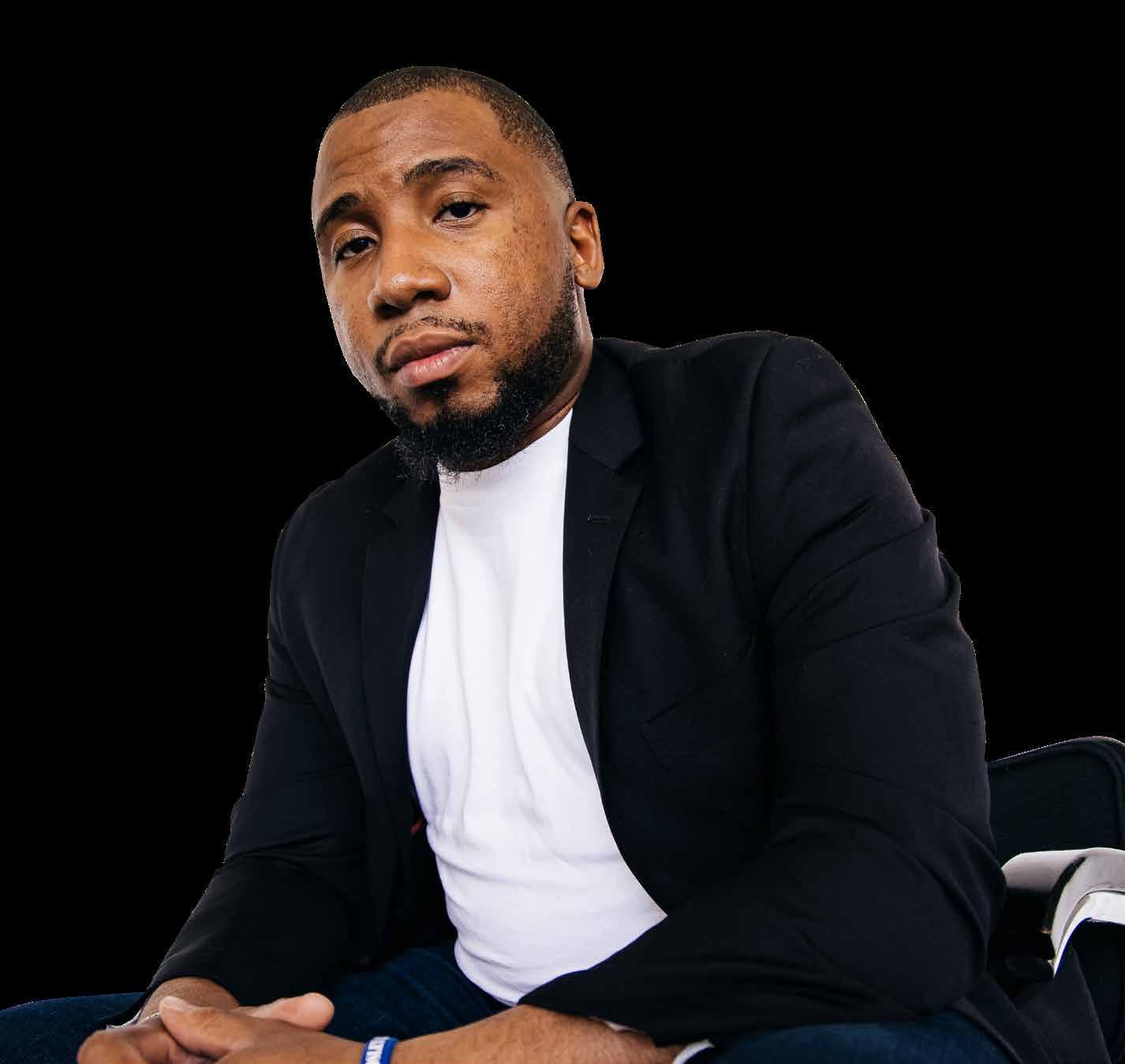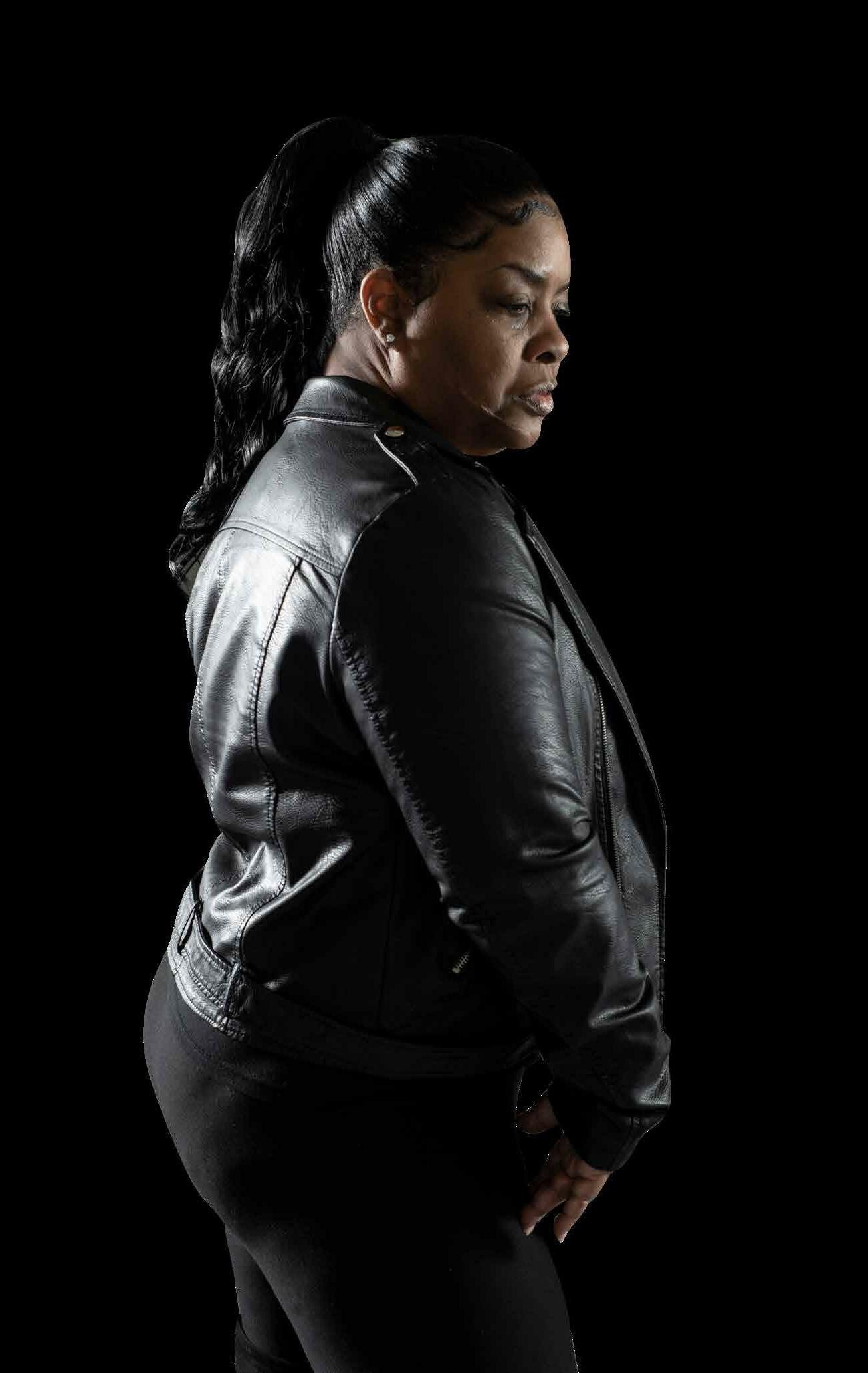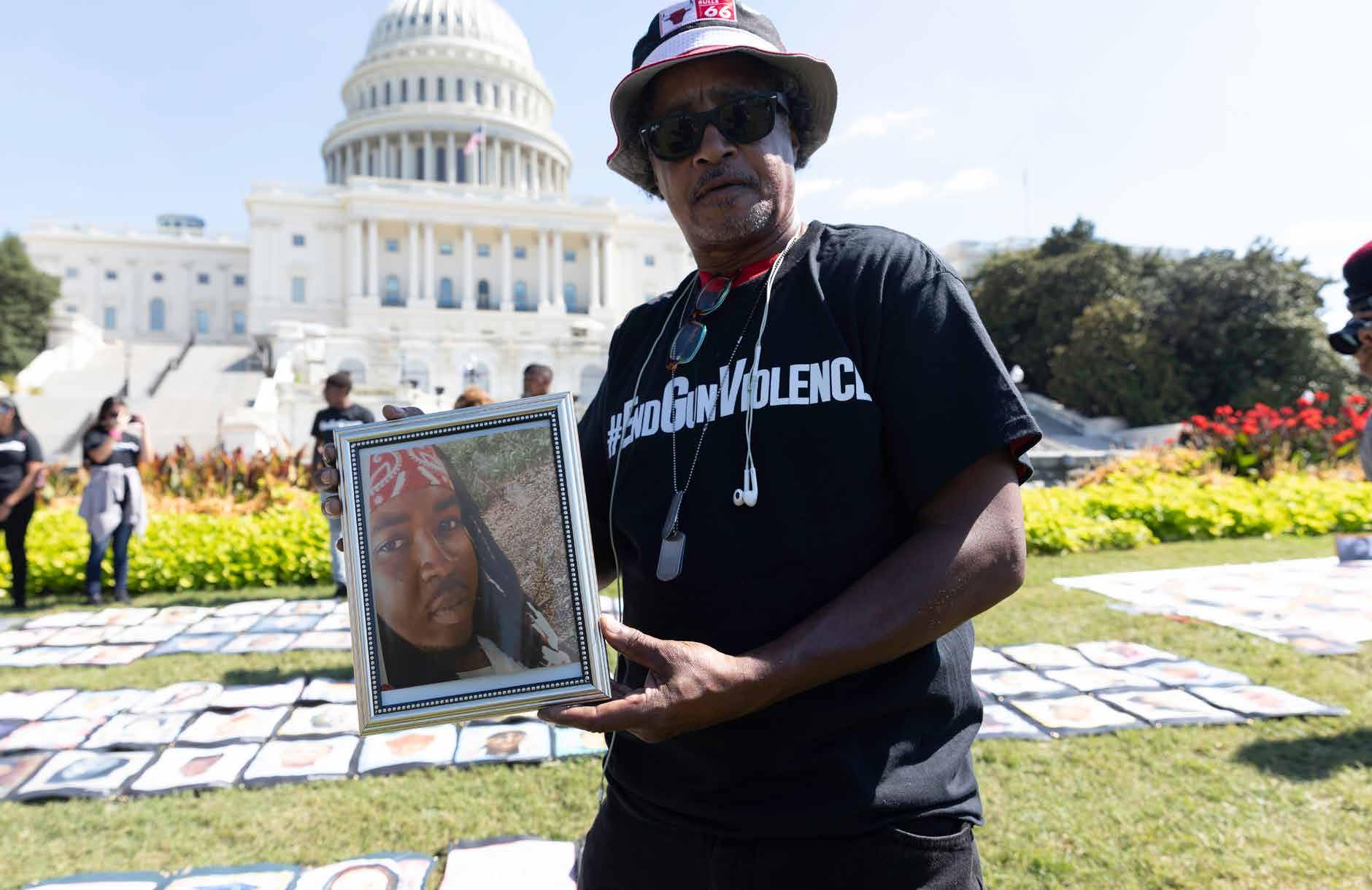
13 minute read
ON THE FRONT LINES OF GUN VIOLENCE PREVENTION
from From pain to progress: Confronting the struggle on the front lines of America's gun violence crisis
V. ON THE FRONT LINES OF GUN VIOLENCE PREVENTION



LAMAR JOHNSON
VIOLENCE PREVENTION COORDINATOR, BRAVE CHICAGO
“Growing up in this neighborhood I was exposed to gangs and drugs- it was part of our everyday reality. I played sports – baseball and track and I did a lot of extracurricular activities- so it helped keep me out of trouble.
Kids choose their lifestyle because they don’t have money- they do what they need to survive. In many cases they have no hope- they don’t have a strong family structure, so they turn to the streets for it. Luckily for me- and it is luck- the only reason – I’m lucky – is- I didn’t get caught. I did just enough to not be consumed by it- gangs/shootings that is- but I had other things to focus on.
The kids are the ones that came up with what BRAVE stands for. They said- it should stand for Bold Resistance Against Violence Everywhere. It started in 2012- with the first class of kids- about 15 of them. The concept is that we are working with teens and I wanted to do it because I grew up in this neighborhood. I knew the challenges they face.
The goal of BRAVE is: what can teenagers say and do to promote peace.
[After Parkland] We sat on the floor of Emma’s (Emma Gonzalez) house- and just talked. As a high school senior Emma survived the February 2018 Stoneman Douglas High School shooting in Parkland, Florida, and in response cofounded the gun-control advocacy group Never Again MSD. “You see- it was normal to us- the violence and trauma of guns- so to see these Parkland (Marjory Stoneman Douglas High School) kids so shell-shocked was strange. We were literally seeing the privilege being knocked off of them. But the unique part about those teens – what they are doing- it is what adults should be doing--- they weren’t afraid to talk about race and socio-economic differences.”
That’s where human rights come in—whether it is Chicago and gun violence in our neighborhoods or mass shootings in a suburb- it is about gun violence. It is about trying to stay alive. Parkland put America at a vulnerable place. And they had to watch. And the great thing about teenagers- the reason I like working with them- is that they have no filter. They deserve to have a platform because they are living it. They are living the struggle- and that is what inspires me. I mean- these kids- they teach me, they keep me going when I feel hopeless. I want them to see that there is a world outside their environment, and they can be a part of it- they can be more.”
MAR’YUM PATTERSON

“A lot of people don’t know what we do and the intensity of the work and its value. I’m from Glenville- in Cleveland, OH. I grew up here- and it was a wonderful place to grow up. I excelled in school- I was a great student- but at 15 years old- I got pregnant with my son. My teachers were amazing and so supportive. I think they knew I was a good student, and they didn’t want to lose me- or for me to drop out. So they offered to babysit anytime. I had a good strong family- so I didn’t need to use their help that much- but it inspired me and welcomed me to keep going. The love that they poured into me- and they weren’t even my family- well I wanted to give it back to the community.

It started with helping my kids’ friends- I would try to talk to them and lead them in the right direction. I was very careful with my kids. I was the mom of the neighborhood. I became a support system for the kids. When kids got in trouble, I helped them. I taught them. I helped them access resources, education- I taught the kids how to interact with the police, etc. A lot of these kids- they have no family support, or they live with very elderly relatives who can’t help them.
In 2016, I started as an Outreach Worker for the Cleveland Health Alliance. We dealt with youth from ages 13-30- we gave them access to social workers, case management, hospital, safe passages to school (we are outside of hot spots for six schools), court-involved- juvenile and first offenders -we help them to have a different life- go to court with them in hopes of getting it thrown out- we just want to give them a second chance at life.
You can’t help one person - you have to help the whole household. You have to help the whole community. That’s how Cleveland Peace Alliance is successful.
We work to support in a holistic way, where we are trying to support the survivor and the whole community – so we can save lives. For me- this is personal. I have nine friends- close friends- people I talk to everyday that have lost their children to gun violence. Two of them have lost both of their children. My son has been caught in the crossfire before- but luckily he is still here- so you know- everyday I wake up and I just pray I can save a life.”


TIA BELL
The T.R.I.G.G.E.R. Project started because I represented 4Youth (my organization) on a community-based solutions panel for the Annual Gun Violence Prevention Conference in Washington, D.C. in 2019. I didn’t know it was a national movement. I didn’t know that there were all these well-established organizations and all this money working on gun violence - I had no idea. Greg Jackson from Community Justice Action Fund asked me to run this panel and I made everyone do the same games I did with my kids- to center people in my type of violence. I was representing community-based solutions- but then I realized I’m the only person from D.C. at the whole conference! I couldn’t believe it. How could we be having a conference on gun violence in a city with such high rates and have no impacted individuals from communities.
Driving home from the conference I was passing all of the places my friends died- where they were shot and killed- and I was getting so mad. No one represented gun violence from my point of view. I had a dream that night that I was the shooter and no one recognized me- I was walking through a gentrified place and no one saw me and then I saw a gun and I picked it up and then everyone saw me. T.R.I.G.G.E.R. stands for True Reasons I Grab a Gun Evolves from Risk.
That’s how T.R.I.G.G.E.R. started–out of a feeling–lack of representation–the struggle and neglect of our communities.
Literally- we got a trigger finger and now with so much gun violence all over the country- we all know what it feels like to lose a child- Black and white. People always talk about senseless gun violence- but I don’t like to say senseless violence. There is no senseless violence because it makes sense to that person – it’s not right, but to them it is justified. And It’s not just a Black people problem. There are so many layers to this monster- but we need to include impacted people to solve the problem. We need to understand what’s happening in our communities. T.R.I.G.G.E.R. is really about the intersectionality of gun violence, public health, social justice and youth development. It helps parents see the T.R.I.G.G.E.R. evolution – and the need for intense intentionality of youth development.
JAMES TIMPSON
DIRECTOR OF COMMUNITY PARTNERSHIPS AND SAFETY, ROCA BALTIMORE
I think there is a level of trauma in Baltimore that is unmatched. It is like a war-torn country. Our communities haven’t gotten the support they need to stem the tide of violence. The city hasn’t ever really made a commitment. I worked hand-in-hand with Dante Barksdale at ROCA Baltimore - he was one of my best friends and an incredible person. We were like a dynamic duo. We talked a lot about how we would change things, and our commitment to this work. Earlier this year, Jan. 17, 2021, he was shot and killed in the streets. Dante was murdered while mediating a dispute- the police haven’t made any arrests yet. It’s the reason I still do this work. For me, this work is way more personal than it ever was before. I’m trying to save lives.
We deal with a limited population - only 200 kids. In the time since COVID started, I’ve lost 12-13 of my kids in the program- they were shot dead. And 15-20 were shot but survived. It’s alarming how many people we are losing. The burden of this work is really heavy and I want these kids to know it is OUR privilege to work with THEM- not for them to work with us. We want these youth to know that change is possible. We want them to believe this.

I want to see change and sustainability. I want to see a community where young men of color are thinking. Now is the time to confront difficult situations.
I think about all of the inequities, disparities, lack of diversity and how this impacts our communities. American has to wake up. Because we are dealing with a forgotten population. People are quick to ostracize but they don’t think about why they got there. How did this young person get to the point where they feel comfortable doing this? What is the trauma that led to this?
I know we have to keep going and while the money trickles down from these federal and state programs and initiatives- we have to keep the infrastructure going. I really feel that the way I can honor Dante’s legacy is by continuing this work. I never want to let his legacy die.
VI. GUN VIOLENCE IS A HUMAN RIGHTS CRISIS IN THE U.S. WITH BLACK & BROWN COMMUNITIES BEING DISPROPORTIONATELY IMPACTED
The U.S. has either signed or ratified several international human rights conventions that guarantee human rights impacted by gun violence and firearm-related injuries and deaths, including the International Covenant on Civil and Political Rights (ICCPR), the International Convention on the Elimination of all Forms of Racial Discrimination (ICERD), the Convention on the Elimination of all Forms of Discrimination Against Women (CEDAW), the Convention on the Rights of the Child (CRC), and the International Covenant on Economic, Social and Cultural Rights (ICESCR). The U.S., therefore, has a legal obligation to respect, protect and fulfill the human rights set out in these treaties and to exercise due diligence by taking measures to combat actual or foreseeable threats to these rights, including the right to life. In the context of firearms, this obligation also includes reducing and preventing violent acts against individuals and communities, addressing discriminatory violence, violence against children, gender-based violence, and the use of firearms in suicides, unintentional and accidental deaths. The U.S. is obliged to exercise due diligence to prevent, punish, investigate and redress harm caused by private individuals and should pay particular attention to those most at risk, be they individuals or marginalized communities.
“Gun violence is inherently tied to human rights because as a human being you deserve respect and acknowledgement and to be seen. Anything that creates trauma, abuse, and inequity- it is a human rights issue-
and gun violence does that. It touches everyone.” 56
Lamar Johnson, BRAVE Chicago
Persistent gun violence in the United States is denying people their human rights including their right to live, the right to security of person, and the right to be free from discrimination. The U.S. must do more. As the United Nations Human Rights Committee has affirmed, “The state has a duty to actively prioritize marginalized communities who face the biggest obstacles to realizing the full spectrum of their rights. When a state fails to act with sufficient due diligence in preventing or responding to gun violence, this can violate an individual’s right to equality before the law.”57
The United Nations Committee on the Elimination of All Forms of Racial Discrimination highlighted the issue of gun violence in their reports on U.S. human rights compliance.58 They remain concerned at the increasing numbers of gun-related deaths and injuries in the U.S. and the disparate impact on racial and ethnic minorities. Both committees noted that the U.S. government’s failure to curb gun violence constitutes a violation of the rights to life and to non-discrimination under international law. Gun violence also undermines the enjoyment of economic, social and cultural rights, including the right to health and the right to education.59
The full enjoyment of all human rights requires a holistic approach which looks not just at individual violations but at patterns of violations embedded in specific socio-economic realities. The U.S. has a duty to ensure that it does not discriminate on any of the grounds protected by international law and that it takes measures to remedy the legacy of discrimination and ensure that rights are enjoyed equally by everyone. This includes actively prioritizing marginalized communities in order to remove obstacles to their realizing the full spectrum of rights.
“For too long, the way the U.S. government has addressed the issue of gun violence has been negligent at best, and disastrous, at worst. Gun violence remains one of the primary issues threatening the human rights
of communities across this country.” 60
Bob Goodfellow, Acting Executive Director of Amnesty International USA
Thus, the failure to establish a comprehensive, meaningful and working system of firearm regulations is a breach of the U.S.’ obligations under international human rights law.
The consequences of this breach are both obvious and catastrophic, but they are not irreversible. The U.S. should act proactively to promote and protect human rights by implementing a system of laws which work adequately to restrict access to firearms to those most at risk of abusing them and by taking effective steps to put in place and implement violence reduction or protection measures where gun violence persists. In its March 2021 response to the United Nations Universal Periodic Review of the U.S.’s human rights record, the U.S. accepted recommendations to work towards limiting armed violent crimes by regulating possession and use of firearms and reducing gun violence and gun-related deaths and injuries, which disproportionately affect members of racial and ethnic minorities.61 Throughout the UPR process, numerous member states and civil society organizations expressed concern regarding the human rights impact of gun violence and recommended that the U.S. take action to address gun violence and its disproportionate impact on certain communities.62
“The U.S. should take necessary measures to reduce gun violence, [we are] concerned at the large number of gun-related deaths and injuries, which disproportionately
© NurPhoto




